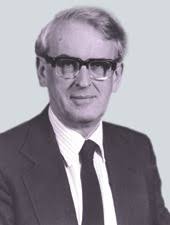David Chilton Phillips facts for kids
Quick facts for kids
The Right Honourable
The Lord Phillips of Ellesmere
|
|
|---|---|
 |
|
| Born |
David Chilton Phillips
7 March 1924 Ellesmere, Shropshire, England
|
| Died | 23 February 1999 (aged 74) Royal Marsden Hospital, London, England
|
| Known for | Determination of the structure and catalytic mechanism of lysozyme. Contributions to the techniques of X-ray crystallography. Public service in science and government. |
| Awards |
|
| Scientific career | |
| Institutions |
|
| Doctoral students |
|
| Other notable students | Janet Thornton (postdoc) |
David Chilton Phillips, Baron Phillips of Ellesmere (born March 7, 1924 – died February 23, 1999) was a very important British scientist. He was a pioneer in a field called structural biology. This means he studied the tiny structures of living things.
Phillips was also a major figure in both science and government. He helped shape how science was done and used in the United Kingdom.
Contents
Early Life and Education
David Phillips was born in Ellesmere, Shropshire, England. His father, Charles Harry Phillips, was a master tailor and a Methodist preacher. His mother, Edith Harriet Finney, worked as a midwife.
David's mother's father, Samuel Finney, was a coal miner. He also became a union official and a Member of Parliament. David's birthplace, Ellesmere, later became part of his special title, Baron Phillips of Ellesmere.
He went to Oswestry High School for Boys. After that, he studied at the University College of South Wales and Monmouth. There, he focused on physics, electrical engineering, and mathematics.
His university studies were paused for three years. From 1944 to 1947, he served in the Royal Navy. He worked as a radar officer on a ship called HMS Illustrious.
After his naval service, he returned to Cardiff. He finished his degree in 1948. Then, he continued his studies with Arthur Wilson. David earned his PhD in 1951.
Career and Scientific Discoveries
After getting his PhD, David Phillips did advanced research. He worked at the National Research Council in Ottawa, Canada, from 1951 to 1955. Then, he joined the Royal Institution in London.
In 1966, he became a Professor at the University of Oxford. He taught Molecular Biophysics in the Department of Zoology. He stayed there until he retired in 1990. During this time, he was also chosen as a Fellow of the Royal Society (FRS). He served as their Biological Secretary from 1976 to 1983.
Unlocking the Secrets of Lysozyme
One of Phillips's most famous achievements was in 1965. He led a team at the Royal Institution in London. They figured out the exact atomic structure of an enzyme called lysozyme.
Lysozyme was first found in 1922 by Alexander Fleming. It is present in tears, mucus, and egg white. This enzyme helps fight off certain bacteria. So, understanding its structure was a very important scientific goal.
David Phillips not only solved the structure of lysozyme. He also explained how it works to destroy bacteria. He did this using a clever method called X-ray crystallography. This technique uses X-rays to create a picture of a molecule's atomic structure.
Phillips learned about X-ray crystallography during his PhD studies. He later made big improvements to this technique. His work helped many other scientists understand molecules better.
Honors and Public Service
David Phillips received many honors for his work. In 1979, he was made a Knight Bachelor. This means he could use "Sir" before his name. In 1989, he became a Knight Commander of the Order of the British Empire (KBE).
In 1994, he was given a special title: Baron Phillips of Ellesmere. This made him a Life Peer, which is a member of the House of Lords. The House of Lords is part of the UK Parliament.
In the House of Lords, he led a committee on Science and Technology. He is known for helping Parliament get online. In 1994, he also received an honorary Doctor of Science degree from the University of Bath.
In 1980, he gave a series of special talks. These were the Royal Institution Christmas Lectures. His lectures were titled The Chicken, the Egg and the Molecules. These lectures are famous for making science fun and understandable for young people.
Personal Life
In 1960, David Phillips married Diana Hutchinson. He passed away from cancer on February 23, 1999.
 | Janet Taylor Pickett |
 | Synthia Saint James |
 | Howardena Pindell |
 | Faith Ringgold |

